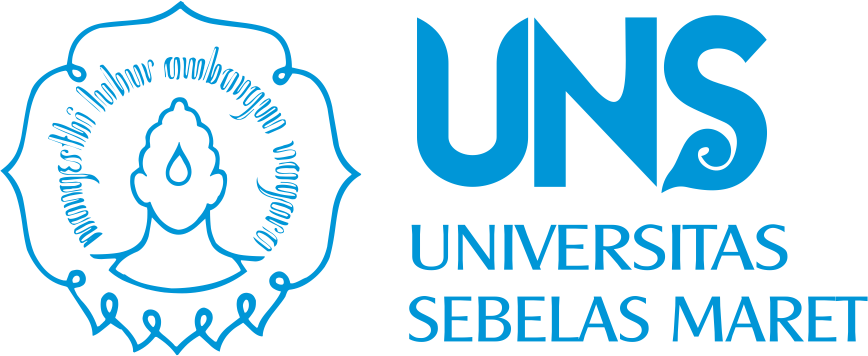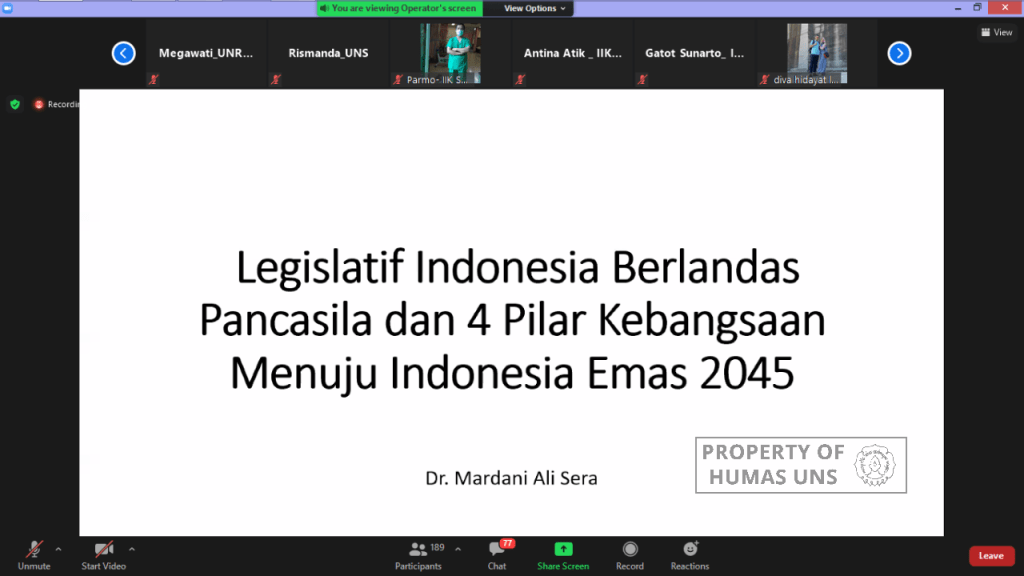UNS — Faculty of Teacher Training and Education (FKIP) Universitas Sebelas Maret (UNS) Surakarta Student Board (DEMA) held a Legislation School on “Shaping Young Talented Legislator with Pancasila Values to Achieve Golden Indonesia 2045” on Saturday (7/8/2021) through the Zoom Cloud Meeting.
The school invited several speakers, such as Mardani Ali Sera (Member of Commission II DPR RI), Khoirunnisa Nur Agustyati (Executive Director of Association for General Election and Democracy (Perludem), Azka Abdi Amrurobbi (Secretary-General of Independent Committee for General Election Awareness), and Iknanda Januar Rizaldi (Chairman I Student Consultative Assembly (MPM) Universitas Gadjah Mada (UGM) Yogyakarta 2021).
Khoirunnisa Nur Agustyati, as the first speaker, delivered material on “The Reflection of Democracy in Indonesia”. As the Executive Director of Perludem, she discussed the democratic performance in Indonesia, which she thinks continues to decrease. “From what I got from the International IDEA report, Indonesia falls under the low-performance category. It is still a democratic country, but the performance is low and weak,” she said.
However, the data published by Global State of Democracy which is used by The International IDEA in 2019, Indonesia was still categorized as mid-range performance. But this year, Indonesia’s democratic performance decreased and got a light green rank with a low democratic performance level. Khoirunnisa Nur Agustyati mentioned four indicators that cause the decrease in Indonesian democracy, the increasing distance between political elites, low corruption eradication efforts, and the decline in freedom and gender equality.
“It requires an effort to push democratization in the political parties, continue the general election system reform, and to strengthen the consolidation of civil society,” she explained.
Supporting Khoirunnisa Nur Agustyati, Azka Abdi Amrurobbi also mentioned that Indonesia experienced a decrease in democratic performance according to the data released by the Economist Intelligence Unit, Freedom House, and Freedom Institute. These institutions said that Indonesia is experiencing a democratic decrease; for example, the Economist Intelligence Unit classified Indonesia’s democracy as flawed. “In the Freedom House, since 2018, Indonesia started to have a drastic decline, and according to Freedom Institute, Indonesia has several problems,” Azka Abdi Amrurobbi stated.
He is concerned that if Indonesia keeps experiencing decline, the young generation who will lead the country in the future will be skeptical of politics and lead to ‘political blindness’. Political blindness is defined as someone who has no awareness of the community’s socio and economic condition and on a nation’s wealth that other countries abuse.
“Bertolt Brecht a writer and poet, once stated that the worst case of blindness is political blindness. They do not hear, do not talk, and do not participate in political events. They do not know that living cost, nut price, fish price, flour price, and rent cost depends on a political decision,” he added.
The next speaker, Iknanda Januar Rizaldi, shared more on his experience and views as MPM/ Dema/Student Representative Board (DPM) in the student government. He stated that the supervisor function on the Student Executive Board (BEM) is a vital role of Dema to create check and balance principles in the student government. However, the judicative institution is absent, unlike in the Trias Politika system. “There are at least four aspects that become the function of campus legislative board, including legislation, aspiration, budgeting, and supervision,” Iknanda Januar Rizaldi explained.
As the last speaker, the member of Commission II and the Deputy Chairperson of the Agency for Inter-Parliamentary Cooperation (BKSAP) DPR RI, Mardani Ali Sera, explained that comprehension of the complexity of Indonesia as a nation is needed to shape young legislators with Pancasila values. This statement is based on the “The Short Story of Indonesia, the Unlikely Nation?” book written by Colin Brown. Mardani Ali Sera stated that the unity of Indonesia is a miracle because the country is very diverse in terms of ethnicities, languages, religions, traditional beliefs, geographical diversity, cultures, and population, which reached 270.20 million people in the 2020 census.
“We need to see (Indonesia) from bird view to see the complexity of the nation. Collin Brown, after understanding the complexity of Indonesia, mentioned that the country would find difficulty to unite. But miraculously we united, Bhinneka Tunggal Ika and Pancasila are one of world wonder that we need to maintain,” Mardani Ali Sera said.
On the occasion, he also mentioned the importance of input, process, and output quality in the executive, legislative, and judicative institutions. “It is quite simple. There are input, process, and output. If the input is good, the process is good; the output will be good. It needs to be by the concept and follow the rules,” he added.
He also explained that the Trias Politika from Montesquieu had experienced development according to the state dynamics with the inclusion of a new institution, accountative. The Deputy Chairperson of BKSAP DPR RI stated that accountative character should appear in all institutions in Indonesia, from the president-vice-president to even the DPR.
“This is accountative; everything should be transparent and accountable,” he concluded. Humas UNS
Reporter: Yefta Christopherus AS
Editor: Dwi Hastuti


